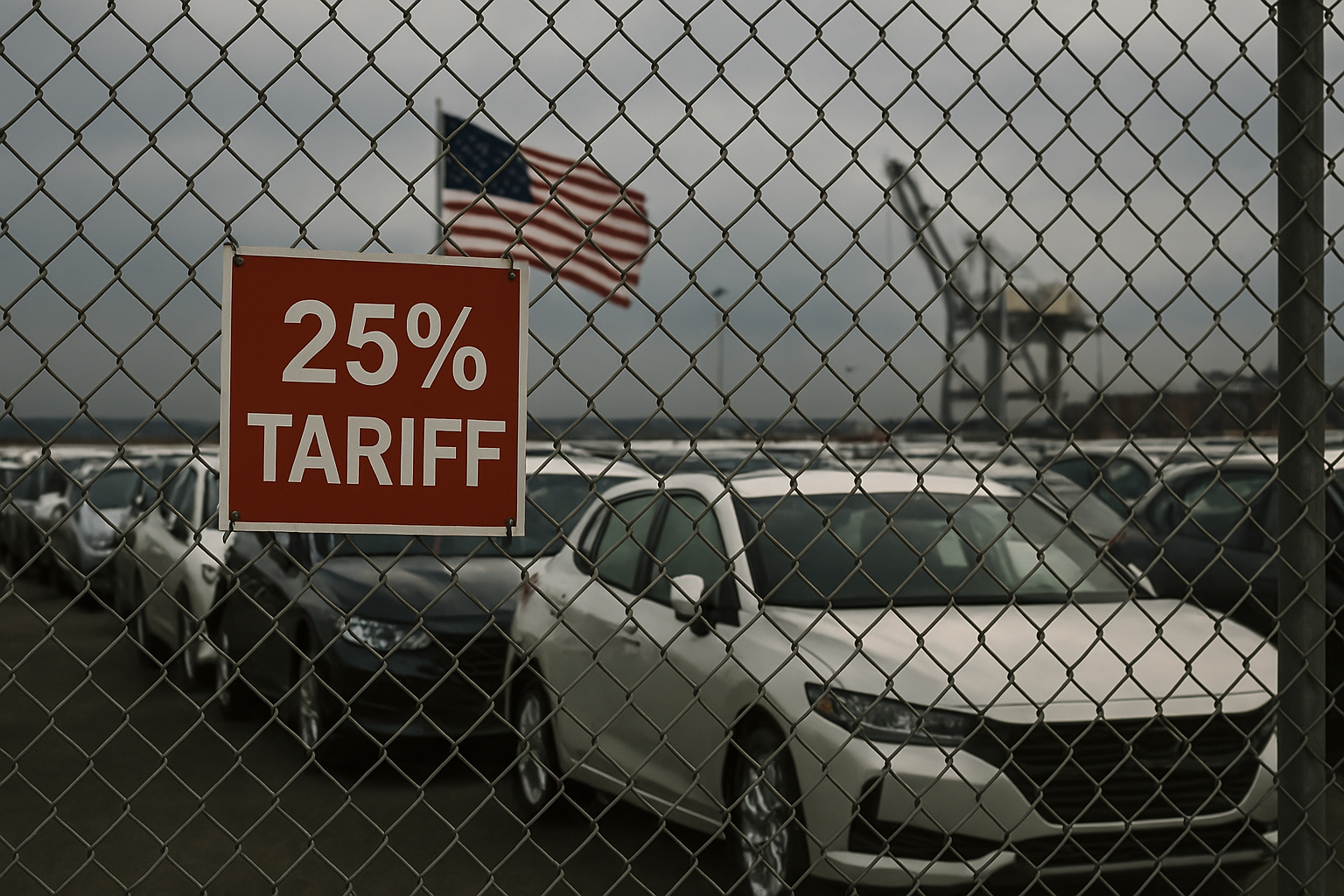Trump's Auto Tariffs Ignite Economic Storm

In a bold move escalating global trade tensions, President Donald Trump announced a substantial 25% tariff on all imported cars and light trucks, effective from April 2, 2025. This decision represents a notable shift in U.S. trade policy, targeting not only complete vehicles but also essential automotive components such as engines, transmissions, powertrains, and electrical parts.
President Trump argues these tariffs are vital for enhancing domestic manufacturing and protecting national security, addressing perceived threats to America's industrial capabilities and supply chains. Trump cited Honda’s recent investment in a new facility in Indiana as proof of his strategy’s effectiveness, asserting that tariffs incentivise foreign automakers to invest domestically.
Market Reaction and Consumer Impact
Financial markets swiftly reacted negatively to the announcement, highlighting widespread concern among investors. The S&P 500 dropped by 1.2%, the Dow Jones Industrial Average shed 130 points (0.3%), and the technology-heavy Nasdaq fell 2%. Specific auto industry players felt immediate effects; Tesla's share price declined by 5.5%, and General Motors fell by 3%.
Economists warn that these tariffs will lead directly to considerable price increases for consumers. Analysts from the Anderson Economic Group estimate price hikes ranging from $3,000 to $12,200 per vehicle, depending significantly on the specific model and the implementation details. Such sharp increases could substantially reduce demand for new vehicles, potentially causing layoffs and job losses in both the American and global automotive sectors.
Complications in International Trade
Trump’s tariff announcement triggered immediate international backlash, particularly from the European Union (EU), a major exporter of luxury and premium cars to the U.S. market. Ursula von der Leyen, the EU's chief executive, expressed deep regret over the new U.S. measures, highlighting potential disruptions to complex global supply chains. The EU has pledged to seek negotiated solutions, but analysts fear retaliatory measures could rapidly escalate into a broader trade war.
Global automakers have voiced strong opposition, noting these tariffs could significantly raise production costs globally, harming international competitiveness and profitability. For example, European luxury brands, which rely heavily on the U.S. market, are likely to face particularly acute challenges, potentially prompting a restructuring of their supply chains or a reconsideration of their market strategy in North America.
Revenue Gains vs Economic Losses
The Trump administration argues these tariffs will generate significant revenue for the U.S. government, intending to offset the substantial costs of prior tax cuts and facilitate reinvestment in domestic manufacturing. Early projections suggest these tariffs could indeed yield billions annually, conditional upon import volumes and the extent to which automakers restructure their supply chains to avoid tariffs.
However, many financial experts question whether these potential revenue gains will outweigh broader economic downsides. The anticipated rise in vehicle prices could severely dampen consumer spending, leading to reduced sales volumes. Over time, this could offset or even exceed the tariff revenue benefits, particularly if global trading partners respond with retaliatory tariffs, further escalating economic tensions.
The USMCA Factor
The tariffs are particularly complex under the existing United States-Mexico-Canada Agreement (USMCA). Importers compliant with USMCA provisions could potentially mitigate tariff impacts by certifying higher U.S. content. The White House has signalled plans for a system that would levy tariffs specifically on non-U.S. content for USMCA-compliant automotive parts. However, implementing such nuanced measures effectively could prove administratively challenging, potentially complicating enforcement and compliance for businesses across North America.
Automakers operating under USMCA guidelines will be forced to re-evaluate supply chains rigorously, likely shifting more operations to the U.S. to minimise tariffs. While theoretically boosting domestic employment, critics argue the complexity and immediate cost increases may outweigh long-term gains.
What's Next?
With tariffs set to take effect imminently, global markets and automotive businesses are bracing for impact. Industry stakeholders will closely monitor retaliatory responses from key trading partners, particularly the EU and Asia, as escalating trade tensions could rapidly expand into other sectors.
Businesses operating in affected industries should urgently assess their exposure to these tariffs, considering strategic shifts in supply chains or pricing strategies. The U.S. administration will likely face increased diplomatic pressures to reconsider its approach, especially as domestic economic implications become clearer in the upcoming months. Whether Trump’s gamble pays off or deepens into a costly trade war remains to be seen.
World Liberty Seeks Federal Trust Charter
World Liberty Financial, the crypto venture backed by the Trump family, has applied for a US national bank trust charter... Read more
Saudi Banks Tap Overseas Markets
Saudi Arabia’s banks are borrowing from international markets at their fastest pace on record, as lenders try to squar... Read more
Amazon Continues To Cut 16000 Gone
Amazon has announced plans to cut a further 16,000 roles from its corporate workforce, extending the cost and organisati... Read more
The UK May Have A Voice In Ai
Europe’s AI sector has grown accustomed to playing catch-up. Capital has flowed more slowly than in Silicon Valley, va... Read more
Musk Applies Pressure To BT
Britain’s broadband market has spent the past decade locked in a familiar pattern. Incumbents invested heavily in fibr... Read more
Blackrock Sees EMEA Moving Into Private Assets
BlackRock has warned that investors across Europe, the Middle East and Africa are reshaping portfolios in response to wh... Read more

